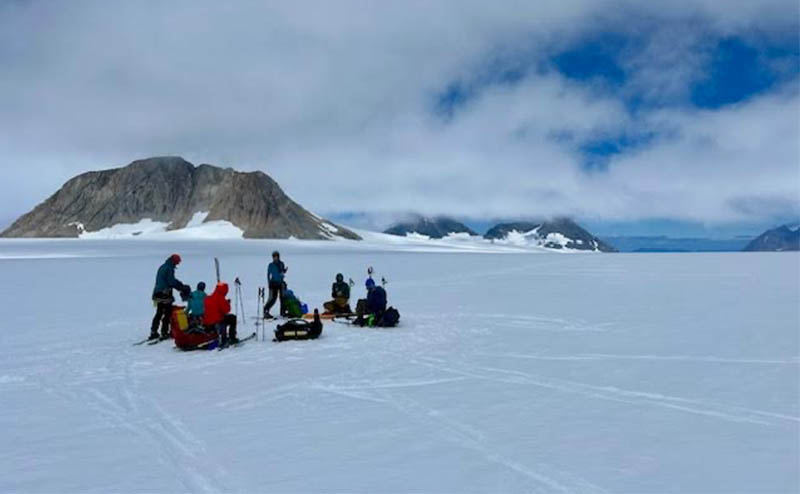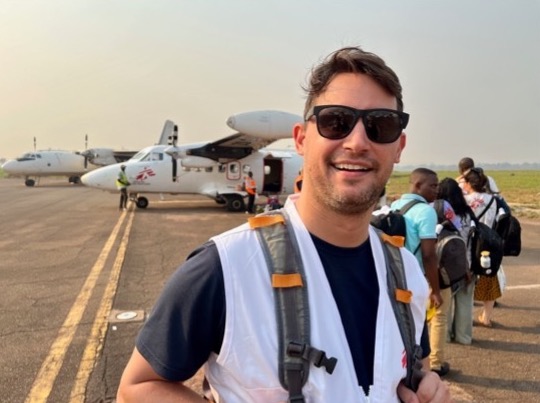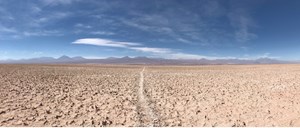
HUMAN/RESOURCES: Ethical Dilemmas for Expedition Doctors
(photo: Teams Safety Meeting on the Juneau Icefield. Credit: Marc Cassone)
Marc Cassone, DO, FACEP, FAWM, DiMM
Chair-Elect, ACEP Wilderness Medicine Section

“Scene Safety!”- one of the tenets of wilderness medicine. As the teaching goes, unnecessary risks by rescuers can lead to further injuries and complicate an emergency scenario by creating additional patient(s), use of resources, and render an evacuation even more complex. This principle applies well for high-stakes rescues in dynamic environments: a high-angle litter extrication, unstable snowpack in avalanche terrain, swiftwater maneuvers. But how does this wildmed dogma apply to low-adrenaline situations and overall expedition behaviors? Does this rule apply differently for expedition doctors than the rest of the team?
Expedition medicine work can be an incredible experience to practice in remote locations with experienced teams and with once-in-a-lifetime recreation opportunities- climbing, skiing, diving, trekking, and more. These experiences are part of the fringe benefits of an often underpaid (or unpaid) adventure job. Expedition doctors will likely be motivated and even encouraged to participate to their maximum capacity. However, should their risk threshold be different than the rest of the team or even from their daily recreation?
Physicians are included in expeditions for their hands-on experience, knowledge, and input- making them a valuable resource to the team. If you were incapacitated or evacuated, what would this mean for the success and safety of the expedition? What happens when the doctor gets injured? Expedition medicine opportunities provide unique work environments in terms of prolonged exposure to risk. To what extent should you “protect” yourself as a valuable resource to the team?
Expedition doctors are often valued for their technical skills (rope rescue, SAR, avalanche awareness, etc.) in addition to their medical background. However, at what point does your medical expertise outweigh the other skills you bring to a team? During “front country-assisted” rescues it may make sense to have a technically trained doctor as part of the hasty or initial evaluation team. Is this calculus different when there is no other backup? When the rest of the team may rely on you for days, weeks, or even months to come?
As proponents for the health of the team, expedition doctors are not only responsible for treating injuries and illness, but also prevention- part of this is safety. To what extent do they need to model good behaviors and set the example for the team? This may mean more than just demonstrating good hand hygiene before meals and wearing a helmet when appropriate but also showing appropriate risk calculation during activities. Team members may say, “if the doctor is doing it, that must mean it’s safe.” Expedition doctors bring a unique perspective to a team- what are the medical, evacuation, and team safety consequences if someone were to break a femur? Ensuring expedition success can be a fine line between being “Dr. Buzzkill” and bending to team peer pressure in increasingly high-risk situations to reach an objective.
Unlike work in an emergency department, expedition doctors are often not the team’s leader, but rather a valuable consultant. High stakes decisions often come down to guides or trip leaders who have to weigh in many factors- weather, terrain, group dynamics, resource utilization, and a successful expedition. Ideas of a successful expedition may vary- “get everyone back in one piece” vs “attain the summit”- and hopefully are not often at odds. Risk threshold may vary as well and can be based on knowledge and prior experiences- what a doctor may consider unsafe may be less risky as perceived by a trip leader. Similar to work in the emergency department, expedition doctors may default to “worst first” or “what could be the worst possible outcome”? Clear expectations and open lines of communication are key.
There are no easy answers to these ethical questions- however they are important to consider and communicate when working in expedition contexts. While these decisions vary greatly by context, expedition physicians should always think twice before they decide to “send it”.



